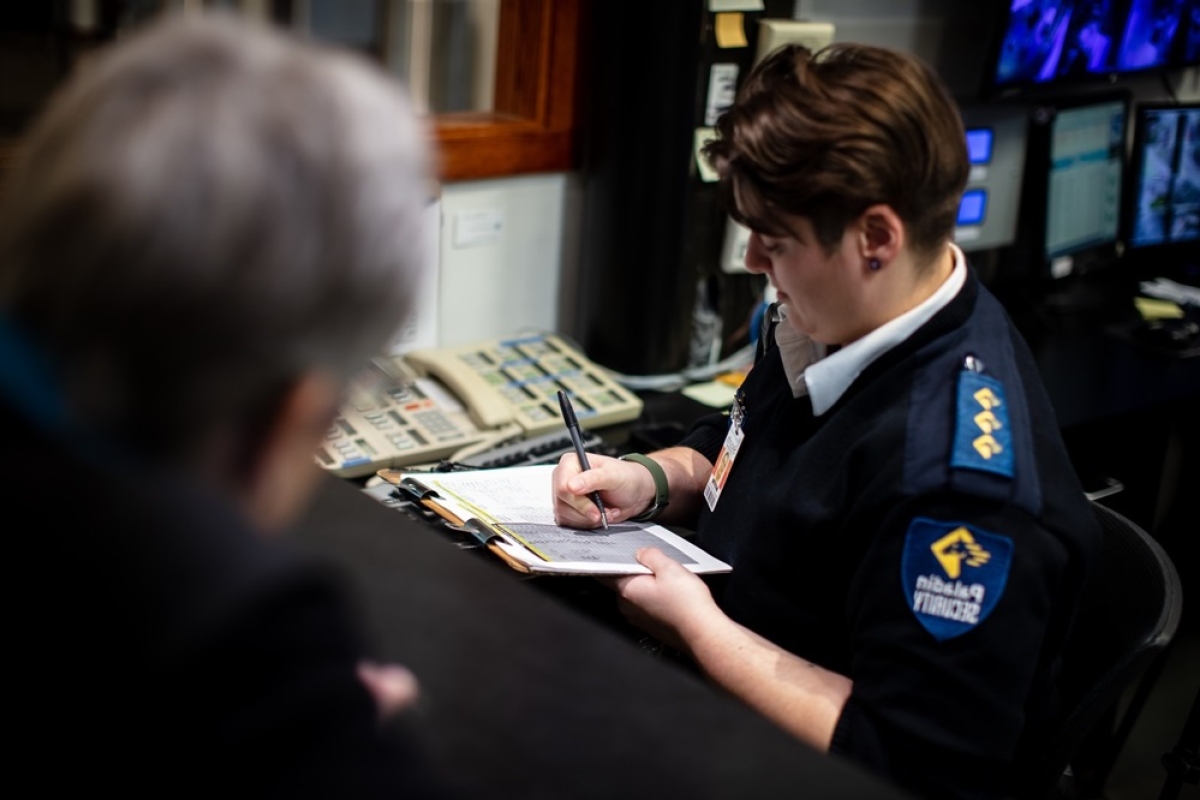Career Overview
Security guards and other related workers protect property against theft and vandalism, control access to establishments, maintain order, and enforce regulations at public events and within establishments, conduct private investigations for clients or employers and provide other protective services not elsewhere classified.
People in these occupations:
- Work for public and private security agencies, retail stores, transportation facilities, residential complexes, educational, financial and health institutions, industrial establishments, cultural establishments and organizations throughout the private and public sector
- May be self employed
- Should have strong observation and communication skills, the ability to maintain self control and the ability to make quick decisions during emergency situations
- Should also be comfortable working alone and must be able to stick to procedures and set routines
- Must act in a disciplined, honest and ethical manner
Job Titles
Duties
Security guards:
- Control access to establishments
- Operate security control-room equipment
- Patrol assigned areas to guard against theft, vandalism and fire
- Enforce regulations to maintain order and resolve conflicts
- Monitor establishment activities
- Ensure safety and emergency procedures are followed
- Issue passes and direct visitors to appropriate areas
- Check age identification of patrons
Screening officers:
- Inspect and screen luggage or cargo using equipment or hands
- Perform searches of passengers with tools or by hand
- Monitor and screen passengers through screening checkpoints and other procedures
Armoured car guards:
- Drive and guard armoured trucks
- Pick-up and deliver cash and valuables to banks, automated teller machines and retail establishments
Corporate security officers:
- Investigate unlawful acts of employees or patrons of establishments
- Recommend security systems such as electronic detection devices and access devices
Private investigators:
- Conduct investigations to locate missing persons
- Obtain information for use in civil and criminal litigation matters or for other purposes
- May also conduct polygraph tests (integrity surveys) for clients
Retail loss prevention officers:
- Prevent and detect shoplifting and theft in retail establishments
Earnings
Earnings is income that workers receive in exchange for their labour. Depending on the type of employment, earnings can be in the form of wages (hourly), salaries (fixed monthly or annual) or self-employed earnings.
Work Environment
# Workers Employed
13,345% Employed Full Time
47%The majority of security guards work full time 40 hours per week, however, some workers are only employed part of the year since many job opportunities are seasonal.
Many of the facilities that security guards monitor require supervision 24 hours a day year round so workers are often required to work shifts that include evenings, nights, weekends and holidays.
Security guards who watch site activity via security cameras spend a large portion of their day looking at monitors, which may result in eye strain and cause fatigue.
These workers may have to travel when monitoring multiple or large sites, guarding items in transit or working in the transportation industry.
Security guards take leadership roles in emergency situations and may have to handle hostile people, which can sometimes make for a stressful work environment.
Career Pathways
Security guards with a lot of experience may move into supervisory positions in the occupation or into corporate security management. Supervisory courses are offered to those who want to advance their career.
With additional training and education, security guards may move into law enforcement careers. For example, they may become police officers, corrections officers or sheriffs.
Commissionaires have an established system for moving up, with four levels of supervisor positions and three levels of management positions they can compete for.
Occupational Interests
It’s important to understand what kinds of occupations align with your interests.
For more about occupational interests visit Skills for the Future Workforce > Characteristics.
Here are the top occupational interest(s) for this career profile:
Education, Training and Skills
Overall, employment requirements are:
- Completion of secondary school is usually required
- A college diploma in law and security or police technology may be required
- Canadian Air Transport Security Authority (CATSA) certification is required for screening officers
- Security guards carrying firearms require a licence
- Armoured car drivers require a valid Possession and Acquisition Licence (PAL) for both restricted and non-restricted firearms
- Corporate security officers may require experience as a police officer
- Private investigators require provincial licensure
In B.C., security guards do not need secondary school graduation, however, it is preferred. Other requirements include:
- Licensing for all security companies and their employees under the new Security Services Act, which replaces the Private Investigator and Security Agencies Act
- Completion of the Basic Security Training (BST) course with a grade of 60 per cent or higher on the final exam for each course
The course is offered through approved institutions and security companies. Training requirements beyond BST vary depending on where security guards work and include:
- Firearms training for armoured car guards
- Gaming security officer training program offered by the Justice Institute of BC for casino/gaming security guards
- A grade of 75 per cent or higher on the BST exam and several other courses for commissionaires
Individual security companies often provide additional in-house training.
The new Security Services Act will require bouncers, armoured car personnel, in-house security guards, bodyguards and members of the Corps of Commissionaires to be licensed and undergo a criminal background check. Other requirements for security guards may include:
- Level one industry first aid
- A valid driver's license
- A clean criminal record
- Basic writing and speaking skills
- Basic computer skills
- Advanced courses in investigation, writing, interviewing, decision making and ethics
Those who are certified for an occupation by a regulator elsewhere in Canada can apply for the same certification from the regulator in B.C. Under the terms of the Canadian Free Trade Agreement (CFTA), most applicants who are transferring their credentials from elsewhere in Canada will not be required to complete additional training or testing. However, the B.C. regulator may ask applicants to provide further information such as a letter of good standing, references, or criminal record check.
For those who trained outside of Canada and never received certification from any Canadian jurisdiction, a full assessment is likely needed. Most occupational regulators have a process for assessment and recognize internationally trained applicants.
Contact the Ministry of Public Safety and Solicitor General: Security Services for details on how to apply for certification in B.C.
For information about labour mobility in Canada, visit www.workersmobility.ca.
View a list of Professional Regulatory Authorities in B.C.
Education programs in B.C.

Top Skills
Every job calls for a certain set of skills. Knowing those skills is the first step in finding a good career fit.
Here, you will find the 10 most relevant workplace skills. Some are more important to achieving success in a certain career than others. These skills may come naturally to you or you may need to gain them through education, training and experience.
See the list of work-related skills below, ranked in order of importance for this career. Check out the list and see if this career matches your skills—take that first step!
Talking to others to share information effectively.
Using logic and reasoning to identify the strengths and weaknesses of alternative solutions, conclusions or approaches to problems.
Giving full attention to what other people are saying, taking time to understand the points being made, asking questions as appropriate, and not interrupting at inappropriate times.
Keeping track of and assessing your performance, other individuals, or organizations to make improvements or take corrective action.
Understanding written sentences and paragraphs in work-related documents.
Considering the relative costs and benefits of potential actions to choose the most appropriate one.
Communicating effectively in writing as appropriate for the needs of the audience.
Being able to solve novel, ill-defined problems in complex, real-world settings.
Being aware of others’ reactions and understanding why they react as they do.
Adjusting actions in relation to others' actions.
Labour Market Statistics
Discover data, facts and information that have been gathered and analyzed. Learn about the characteristics of the economy and labour market in B.C.
Employment
Find out about employment types and trends by region and industry.
Employment
13,345Employment by Region







| Region | Employment | % Employment of this Occupation |
|---|---|---|
| Cariboo | 355 | 2.7% |
| Kootenay | 195 | 1.5% |
| Mainland/Southwest | 9,215 | 69.1% |
| North Coast and Nechako | 290 | 2.2% |
| Northeast | 150 | 1.1% |
| Thompson-Okanagan | 1,190 | 8.9% |
| Vancouver Island/Coast | 1,955 | 14.6% |
Labour Market Outlook
The B.C. Labour Market Outlook is a 10-year forecast of the expected supply and demand for labour in the province. It’s usually updated every year. The purpose is to provide British Columbians with the knowledge to make informed decisions on careers, skills training, education and hiring.
Forecasted Job Openings (2025-2035)
3,980Forecasted Job Openings
Forecasted Employment Growth Rate
Composition of Job Openings
Job Openings by Region (2025-2035)







| Region | Job Openings | Avg. Annual Employment Growth |
|---|---|---|
| Cariboo | 80 | 0.1% |
| Kootenay | 40 | -0.3% |
| Mainland/Southwest | 2,630 | 1.0% |
| North Coast and Nechako | 60 | 0.3% |
| Northeast | 30 | 0.3% |
| Thompson-Okanagan | 280 | 0.1% |
| Vancouver Island/Coast | 870 | 1.7% |
Industry Highlights
Learn about the opportunities in B.C.'s major industries, including employment trends, earning potential, locations of work and more.
Forecasted Job Openings by Industry
| Industry | Job Openings (2025-2035) |
|---|---|
| Business, Building and Other Support Services | 2,670 |
| Information, Culture and Recreation | 210 |
| Retail Trade | 210 |
| Public Administration | 180 |
| Health Care and Social Assistance | 170 |
Insights from Industry
Security guards are needed to guard construction sites from theft and vandalism. As well, they are needed to protect most commercial and some residential buildings once construction is completed. Since many new graduates quickly move to higher paying jobs outside of the industry, there is currently a shortage of workers in B.C.
There will be growing demand for people with advanced security solutions training and threat/risk assessment skills. Those with previous experience working as security guards, in law enforcement or in the military will have a greater chance of finding work.
Most work opportunities will continue to be in urban centres such as the Lower Mainland and Southern Vancouver Island regions where there are more facilities that require monitoring. There may be higher growth in any port area due to the Transport Canada changes to the Marine Security Act and enforcement.
Increasingly, security professionals are using computers and technological devices in their daily work, so workers must be comfortable using this equipment.. As the use of closed circuit television cameras increases, those who can use monitoring equipment and software will have more job opportunities. However, increased use of closed circuit television monitoring may reduce the number of patrolling security guards needed.
Resources
-
ASIS International – Canadian Pacific Chapter 190www.asis-canada.org
-
Association of Professional Security Agencies (APSA Canada)apsacanada.wordpress.com
-
Canadian Security Association (CANASA)www.canasa.org
-
Commissionaires BCwww.commissionaires.bc.ca
-
Commissionaires BC – Careerscommissionaires.bc.ca/careers
-
Justice Institute of BC (JIBC) Security Training Programswww.jibc.ca/programs-courses/schools-departments/school-criminal-justice-security/justice-public-safety-division/security-training-programs








